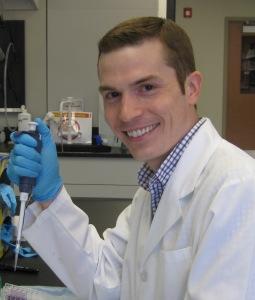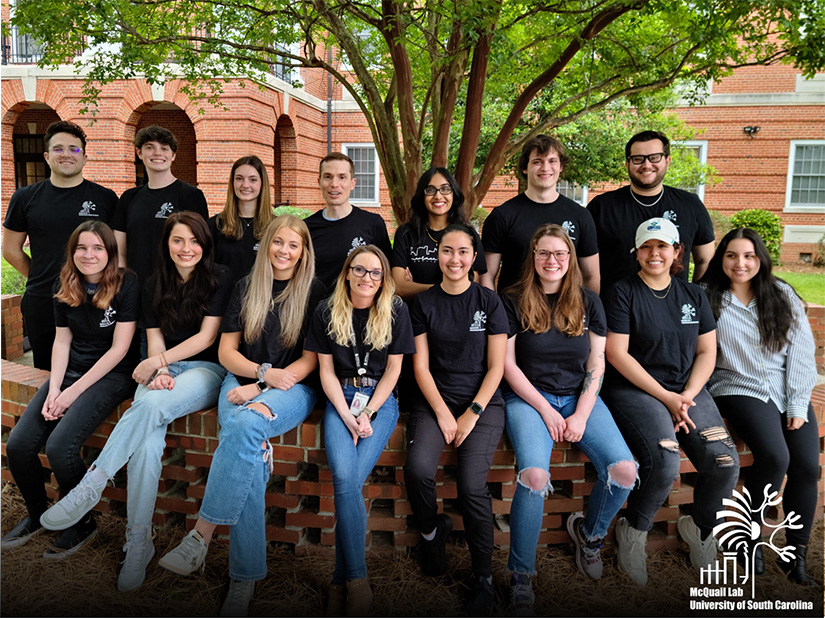School of Medicine Columbia
- SC.edu
- Study
- Colleges and Schools
- School of Medicine Columbia
- About
- Faculty and Staff
- Joseph McQuail
Faculty and Staff
Joseph McQuail, Ph.D.
| Title: | Assistant Professor |
| Department: | Pharmacology, Physiology & Neuroscience School of Medicine Columbia |
| Email: | Joseph.McQuail@uscmed.sc.edu |
| Phone: | 803-216-3528 (office) 803-216-3517 (lab) |
| Fax: | 803-216-3538 |
| Office: | Building 1, School of Medicine Room D54 (office) Room D53 (lab) |

Education
Post Doctoral
Fellowship in Age-Related Memory Loss, University of Florida
Ph.D.
Neuroscience, Wake Forest University
BS
Neuroscience, College of William and Mary
Research
Research Focus:
The McQuail Lab investigates how aging alters brain function and increases vulnerability
to memory loss and Alzheimer’s disease (AD). Our research aims to identify the neural,
molecular, and network-level mechanisms that drive cognitive decline, as well as those
that support resilience. We use behavioral neuroscience as a core approach, leveraging
preclinical rodent models to study both normal aging and AD-related pathology. By
integrating cellular and synaptic analyses with whole-brain imaging and computational
modeling, we seek to uncover targetable mechanisms, discover biomarkers for early
detection, and build a systems-level understanding of cognitive aging. Our work spans
multiple domains—from stress biology and synaptic signaling to executive function
and brain-wide network dynamics—providing a foundation for future interventions and
translational insight.
Does stress push the aging brain toward decline—or adaptation?
Psychogenic stress is a potent modulator of brain function, but its effects on cognition
vary with age and disease state. We are investigating how glucocorticoid signaling
influences memory and prefrontal cortex activity in both normally aging and TgF344-AD
rats, revealing that stress can impair cognition in young adults while paradoxically
enhancing it in older individuals through adaptive mechanisms. These studies explore
how stress interacts with amyloid pathology and synaptic signaling to shape cognitive
outcomes. By identifying critical periods of vulnerability and resilience, we aim
to uncover mechanisms that could be targeted to preserve memory and executive function
in aging and AD.
Is D-serine a missing link—or a molecular misfire—in brain aging and AD?
D-serine is a key co-agonist for NMDA receptor (NMDAR) signaling, essential for learning
and memory. In normal aging, D-serine availability often declines due to reduced neuronal
synthesis, contributing to synaptic dysfunction and cognitive decline. In contrast,
Alzheimer’s disease may involve elevated D-serine levels driven by glial overexpression,
potentially exacerbating excitotoxicity and network instability. We study how these
divergent patterns of D-serine metabolism affect cognition and NMDAR function in both
aging and TgF344-AD rats. By targeting the enzymes that regulate D-serine, we aim
to restore balanced signaling and develop interventions that enhance cognitive resilience
across different stages of brain aging.
When multitasking abilities decline, what does it reveal about the aging brain?
Declines in cognitive flexibility and multitasking are early signs of executive dysfunction
in aging and AD. Using a reverse-translated dual-task paradigm in rats, we study task
switching and mixing costs—behavioral markers that evoke widespread neural activation
and expose deficits in network coordination. By integrating behavioral assays with
whole-brain imaging and computational modeling, we identify how aging and AD disrupt
communication among brain regions and uncover spatial patterns of activation linked
to cognitive decline or resilience. This systems-level approach allows us to develop
predictive models of disease progression and test interventions that restore adaptive
control. Through the fusion of behavioral neuroscience and AI-enhanced brain mapping,
we aim to advance precision diagnostics and therapies for age-related cognitive impairment.
Recent Publications:
Fletcher R, Hoppe M, McQuail JA, Hernandez CM, Hernandez AR. Ketogenic Diet-Induced Alterations in Neuronal Signaling-Related Proteins are Not Due to Differences in Synaptosome Protein Levels. Mol Neurobiol. 2025 Apr 29. doi: 10.1007/s12035-025-04988-1. Epub ahead of print. PMID: 40299298.
Horovitz DJ, Askins LA, Regnier GM, McQuail JA. Age-related synaptic signatures of brain and cognitive reserve in the rat hippocampus and parahippocampal regions. Neurobiol Aging. 2025 Apr;148:80-97. doi: 10.1016/j.neurobiolaging.2025.01.010. Epub 2025 Feb 7. PMID: 39954409.
Braunstein PW, Horovitz DJ, Hampton AM, Hollis F, Newman LA, Enos RT, McQuail JA. Daily fluctuations in blood glucose with normal aging are inversely related to hippocampal synaptic mitochondrial proteins. Aging Brain. 2024 Apr 5;5:100116. doi: 10.1016/j.nbas.2024.100116. PMID: 38596458; PMCID: PMC11002859.
Gandy HM, Hollis F, Hernandez CM, McQuail JA. Aging or chronic stress impairs working memory and modulates GABA and glutamate gene expression in prelimbic cortex. Front Aging Neurosci. 2024 Jan 8;15:1306496. doi: 10.3389/fnagi.2023.1306496. PMID: 38259638; PMCID: PMC10800675.
Burzynski HE, Ayala KE, Frick MA, Dufala HA, Woodruff JL, Macht VA, Eberl BR, Hollis F, McQuail JA, Grillo CA, Fadel JR, Reagan LP. Delayed cognitive impairments in a rat model of Gulf War Illness are stimulus-dependent. Brain Behav Immun. 2023 Oct;113:248-258. doi: 10.1016/j.bbi.2023.07.003. Epub 2023 Jul 10. PMID: 37437820; PMCID: PMC10530066.
Hernandez CM, McQuail JA, Ten Eyck TW, Wheeler AR, Labiste CC, Setlow B, Bizon JL. GABAB receptors in prelimbic cortex and basolateral amygdala differentially influence intertemporal decision making and decline with age. Neuropharmacology. 2022 May 15;209:109001. doi: 10.1016/j.neuropharm.2022.109001. Epub 2022 Feb 19. PMID: 35189132; PMCID: PMC9297337.
McQuail JA, Beas BS, Kelly KB, Hernandez CM 3rd, Bizon JL, Frazier CJ. Attenuated NMDAR signaling on fast-spiking interneurons in prefrontal cortex contributes to age-related decline of cognitive flexibility. Neuropharmacology. 2021 Oct 1;197:108720. doi: 10.1016/j.neuropharm.2021.108720. Epub 2021 Jul 15. PMID: 34273386; PMCID: PMC8478839.
McQuail JA, Dunn AR, Stern Y, Barnes CA, Kempermann G, Rapp PR, Kaczorowski CC, Foster TC. Cognitive Reserve in Model Systems for Mechanistic Discovery: The Importance of Longitudinal Studies. Front Aging Neurosci. 2021 Jan 21;12:607685. doi: 10.3389/fnagi.2020.607685. PMID: 33551788; PMCID: PMC7859530.
Hernandez AR, Hernandez CM, Truckenbrod LM, Campos KT, McQuail JA, Bizon JL, Burke SN. Age and Ketogenic Diet Have Dissociable Effects on Synapse-Related Gene Expression Between Hippocampal Subregions. Front Aging Neurosci. 2019 Sep 13;11:239. doi: 10.3389/fnagi.2019.00239. PMID: 31607897; PMCID: PMC6755342.
Hernandez AR, Hernandez CM, Campos K, Truckenbrod L, Federico Q, Moon B, McQuail JA, Maurer AP, Bizon JL, Burke SN. A Ketogenic Diet Improves Cognition and Has Biochemical Effects in Prefrontal Cortex That Are Dissociable From Hippocampus. Front Aging Neurosci. 2018 Dec 3;10:391. doi: 10.3389/fnagi.2018.00391. PMID: 30559660; PMCID: PMC6286979.
McQuail JA, Krause EG, Setlow B, Scheuer DA, Bizon JL. Stress-induced corticosterone secretion covaries with working memory in aging. Neurobiol Aging. 2018 Nov;71:156-160. doi: 10.1016/j.neurobiolaging.2018.07.015. Epub 2018 Jul 30. PMID: 30144648; PMCID: PMC6162104.
Hernandez CM, McQuail JA, Schwabe MR, Burke SN, Setlow B, Bizon JL. Age-Related Declines in Prefrontal Cortical Expression of Metabotropic Glutamate Receptors that Support Working Memory. eNeuro. 2018 Jun 28;5(3):ENEURO.0164-18.2018. doi: 10.1523/ENEURO.0164-18.2018. PMID: 29971246; PMCID: PMC6026020.
Hernandez AR, Hernandez CM, Campos KT, Truckenbrod LM, Sakarya Y, McQuail JA, Carter CS, Bizon JL, Maurer AP, Burke SN. The Antiepileptic Ketogenic Diet Alters Hippocampal Transporter Levels and Reduces Adiposity in Aged Rats. J Gerontol A Biol Sci Med Sci. 2018 Mar 14;73(4):450-458. doi: 10.1093/gerona/glx193. PMID: 29040389; PMCID: PMC5861916.
Hernandez CM, Vetere LM, Orsini CA, McQuail JA, Maurer AP, Burke SN, Setlow B, Bizon JL. Decline of prefrontal cortical-mediated executive functions but attenuated delay discounting in aged Fischer 344 × Brown Norway hybrid rats. Neurobiol Aging. 2017 Dec;60:141-152. doi: 10.1016/j.neurobiolaging.2017.08.025. Epub 2017 Sep 5. PMID: 28946018; PMCID: PMC5669385.
McQuail JA, Beas BS, Kelly KB, Simpson KL, Frazier CJ, Setlow B, Bizon JL. NR2A-Containing NMDARs in the Prefrontal Cortex Are Required for Working Memory and Associated with Age-Related Cognitive Decline. J Neurosci. 2016 Dec 14;36(50):12537-12548. doi: 10.1523/JNEUROSCI.2332-16.2016. Epub 2016 Nov 2. PMID: 27807032; PMCID: PMC5157101.
Beas BS, McQuail JA, Banuelos C, Setlow B, Bizon JL. Prefrontal cortical GABAergic signaling and impaired behavioral flexibility in aged F344 rats. Neuroscience. 2017 Mar 14;345:274-286. doi: 10.1016/j.neuroscience.2016.02.014. Epub 2016 Feb 9. PMID: 26873002; PMCID: PMC5333995.
McQuail JA, Frazier CJ, Bizon JL. Molecular aspects of age-related cognitive decline: the role of GABA signaling. Trends Mol Med. 2015 Jul;21(7):450-60. doi: 10.1016/j.molmed.2015.05.002. Epub 2015 Jun 9. PMID: 26070271; PMCID: PMC4500156.
McQuail JA, Nicolle MM. Spatial reference memory in normal aging Fischer 344 × Brown Norway F1 hybrid rats. Neurobiol Aging. 2015 Jan;36(1):323-33. doi: 10.1016/j.neurobiolaging.2014.06.030. Epub 2014 Jul 3. PMID: 25086838; PMCID: PMC4268167.
Complete list of Dr. McQuail's Published Work can be found on PubMed
Join the Lab

USC Undergraduates
Our lab is an ideal site to launch your career in neuroscience! Students in our lab receive hands-on training, participate in regular scientific discussions, and hone professional skills. Students can fulfill independent research requirements (i.e., 399) in the lab, apply for and win undergraduate and national research fellowships, write an honors thesis (i.e., 499), and make scientific presentations at local and international meetings. Alumni from our lab advance to training in graduate or medical school or find employment in academia or industry. Interested USC undergraduates can use this link to contact Dr. McQuail.
Current or Prospective Graduate Students
- Motivated and qualified M.S. or Ph.D. candidates should apply to the School of Medicine’s Biomedical Sciences Program. In your personal statement, please expand on your specific interests in connection with our research program and how training within our lab/department/program will help you to achieve your professional goals. Candidates may contact Dr. McQuail directly by email during the preparation of their application or at any point throughout the application process to improve your knowledge of the lab and its role in the training program.
- First-year medical students interested in our research may apply to the SOAR Program. Please contact Dr. McQuail prior to submitting any application so we can collaborate to identify a suitable research project. We also train students in the combined M.D./Ph.D. program; applications are considered from current second-year medical students after acquiring research experience in the lab via SOAR.
Postdoctoral Candidates
Highly qualified Ph.D. recipients or advanced Ph.D. students with demonstrated scientific contributions in the areas of behavioral neuroscience, cognitive aging, stress neurobiology, and/or AD pathogenesis are welcome to send their CV by email to Dr. McQuail for consideration. Any consideration is contingent upon initial availability of grant funds and a clear and credible plan to acquire individual funding that supports continued training at the post-doctoral or mentored faculty levels (i.e., NIH F32, K99, or K01).